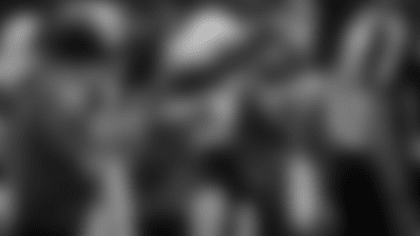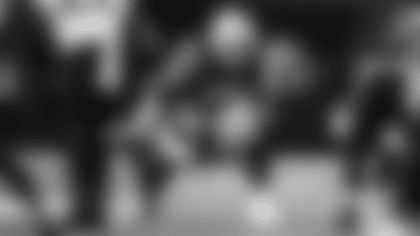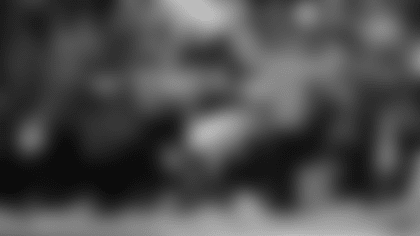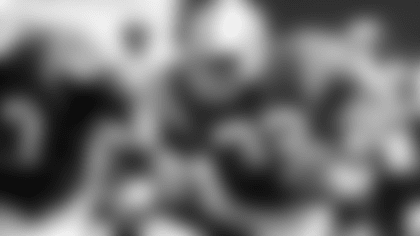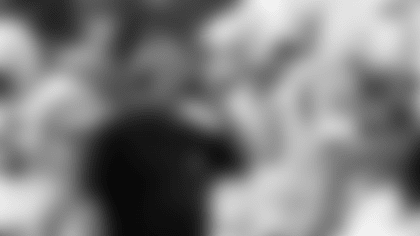INDIANAPOLIS —Indianapolis Colts head athletic trainer Dave Hammer has been appointed the team's infection control officer, a critical role in the battle against the COVID-19 pandemic. Hammer recently sat down with Colts.com's Matt Taylor to discuss what new protocols are in place at the Indiana Farm Bureau Football Center.
Here is that entire conversation, which you can also listen to above:
Dave, you might be the busiest guy I know right now as the point person at the Indiana Farm Bureau Football Center handling every health-related need surrounding the Colts. You name it, the virus has affected the team in terms of football operations: team and position meeting rooms moved all around, plexiglass installed in the locker room, how the team handles meals and snacks. What's it like to be you right now?
Hammer: "Well, personally, it's been a little bit of a challenge, but really, to be honest with you, it's nothing really that much more different than a normal training camp is. I mean, it's still long hours. Your kind of outside of football life gets put on hold for a few months, and you kind of just shoulder through it. But listening to your introduction there and everything like that, I just want people to make sure that they understand that while I might be a point person, so to speak, I really look at it as kind of I'm the tip of the iceberg. Underneath me, there are dozens of people who are making the plan that we've all gotten together and made actually work. I'm not the person that does all this stuff. It's just I happen to be the name on the infection control officer."
OK, so you're the quarterback of the team's COVID-19 plan. We'll put it that way. When the team named you its infection control officer, what did that entail for you? What was the scramble mode like for you putting your staff together to get all this in place?
Hammer: "Well, it was kind of a little bit of a ramp up. As soon as the pandemic hit, honestly, we started looking at, 'What are we going to need to do in this situation when we get back?' Because we didn't know when we were going to come back. At that point, it could have been just a month or two, and it would have been just staff people in the building. So, amongst our athletic trainers and our operations director, Jeff Brown, and everybody, the equipment guys, we got together and decided, 'Alright, here's the things that we might need to think about. And, what are we going to do about that?' So, we kind of had a little bit of a ramp up on that. Things got really crazy about June, early July with protocols that were coming out from the league office and the negotiations they were having with the players association and management council, where they were coming up with these things that we were going to need to provide answers for. So they gave us this framework, and then we had to make that framework kind of fit into our system here."
How challenging has this been on you and your staff to reconfigure the entire Colts complex to represent the safest work environment possible for all these players, coaches and staff during camp?
Hammer: "Well, it's been a little bit of a challenge, but not a great challenge. I'll put it that way. We had a recent expansion and remodeling here at the complex a couple years ago, and that's really helped us out, because it gave us more room to work with for one, which was the big thing. When you're talking about physical distancing, that's what you need, is a little more space for everything that you have to do, and that really helped out with us. That was a little easier than you might think."
Can you give us some details or examples of protocols just in terms of how nitty gritty this thing is — things you've had to implement that the common fan doesn't know or realize just how deep this goes?
Hammer: "Yeah, there's a lot that's already been out there in the media. I think people are pretty well versed on kind of the general idea of things. So, I think one of the things that people may not understand as well as some stuff is that we have these connexon proximity tracers that we walk around with all day back here in the restricted area of the building. What they do is, they're not GPS devices; they're just basically proximity devices. So, when I get near one, when I'm less than six feet from another puck, it starts tracking how long I'm in that zone. So, at the end of the day, these pucks are uploaded to a data system, and they can pull down who's been in contact with who and for how long. And what we're looking for is the close contacts, so that we can kind of eliminate people; if somebody comes up as a positive test, then we can pull the people who are close contacts and pull them out for a little bit and make sure that they're still OK before we let them hang around the building."
I know every team had to come up with a plan that had to be approved by the NFL. How tough was it to come up with a plan in terms of safety? What all and to be inside of that in order to get that approval?
Hammer: "Well, the only thing that made it really tough was the deadline you were under. A lot of this stuff was negotiated obviously with the management council and the players association. So, anytime there's a negotiation, it just drags on and on. By the time we got these, we were kind of getting down into, alright, well, we're starting in a couple of weeks. What happens if we don't get that done, or whatever? So that's what created a lot of stress there, but we did have a framework from the league, which helped us out a lot. But it was just that you get these Friday night at 8 o'clock, and you'd have to work all weekend to get it finalized and done, and get a draft out to somebody to review, and everything. So, that's where it got kind of hairy."
Also new this year with everything going on are these tier systems. There's Tier 1, Tier 2, Tier 3 — what do those tiers mean, exactly, and how tough was it for you to assign people within the organization to those specific groups?
Hammer: "Well, basically Tier 1 and Tier 2 are the people who are back in the restricted area all the time. It includes players. The players are basically Tier 1 people, but then other Tier 1 people are the coaches, the athletic training staff, the equipment staff, strength and conditioning staff, those kinds of people. Tier 2, a typical person would be maybe scouts or people that need to be around the players a little bit, but not all the time. Our operations director is a Tier 2 person, because he can interact with players, but maybe not on an everyday basis kind of thing. Then, Tier 3 people are supposed to avoid contact with tiers one and two. They can be in the restricted area, but only when Tier 1 and Tier 2 are no longer there. So that's some of the people that come at night and clean — that kind of thing. That's how the tiers work. And then it was tough, because we have a small number of people; we were limited to 100 non-players in Tier 1 and Tier 2. We have a coaching staff that, if you include the strength and conditioning staff, is 27 people strong; so our athletic training staff when we have our summer interns here runs 19 strong. So you start adding numbers up, there's a lot of people that you need to fit into that 100, alright? So it was tough to come down; a lot of tough decisions on who's in and who's not, but I think the overriding thing people need to understand is that the word non-tiered isn't synonymous with non-essential, so everybody that we have in the building here is essential, but they gave us these numbers to work out, and that's what we did — we had to pare it down to, really, the bare minimum."
What kind of buy-in are you seeing from the players and the coaches in terms of understanding the protocols and just doing everything they're supposed to be doing as they come back into the building for training camp?
Hammer: "We've got a lot of buy-in. We have a lot of good people that work here. They understand what's important, and it's not just football that's important; you know, we're talking about family, friends, other people that you work with here in the building, it's important to everybody, and we all need to just kind of buy into the process and do what we're supposed to do."
From an outside standpoint, how many "new people" in terms of testing and screening, are involved in the training camp process this year because of what's going on with the pandemic?
Hammer: "The people that are doing the testing for us on-site here, that do the daily samples and everything and run the tests and all that stuff, they're kind of outside contractors. I don't have an exact number — there's probably a dozen or so of them that work here every day. There's a few more people that were added to the staff in the cafe just because of the way that the food has to be prepared and distributed, they needed a little bit more help there, but really, inside the restricted area, if you will, kind of what's football operations right now, it really wasn't adding a lot of people because you were stuck with that 110 limit on Tier 1 and 2, and there's a certain limit for Tier 3, even. So, really, it was about repurposing jobs for people at different times of the day. Like, we have athletic trainers and equipment managers and scouts, even, who are doing the screening in the morning when people come in, and then once that screening is done they transition into what would be their quote-unquote normal job, if you will. So it was more about repurposing people in different roles and what had to be done at a certain time kind of thing than it was adding people in."
You've seen it all; you've been with the Colts dating back to their Baltimore days. You're great at what you do — you were named the NFL's Athletic Trainer of the Year back in 2018. Just curious: where does all this offseason stuff rank for you in terms of challenges and tough conditions?
Hammer: "I'd say on a scale of one to 10, with 10 being the most difficult one you've ever had, this has got to rank up around a 20 or so. This has been really challenging."
Has the magnitude of this role for you set in yet? I know it's not just you — you've got a large staff doing all this stuff in concert — but you're a huge part of the success of this season. If the Colts go out there and they win on Sundays, a big reason is because of you.
Hammer: "Well I can appreciate that, and then what I really appreciate is adding the extra pressure onto the job there a little bit (laughs). But honestly, it really isn't much different than it is any year. I mean, anybody that you see out on the field, lined up on the sidelines on gameday, has a critical role in what happens. That doesn't take away from the rest of the building — I mean, they all have a critical role in the function of the organization as well, as a whole — but for the people that are out there kind of for the public to see, all those people are critical. And you kind of live with this day in and day out all through the year. I mean, it's even the offseason where everything you're doing is designed to try to help this club as much as they can, so the kind of thing you live with day to day is let's do the best we can do and hope that you don't make a critical error at a critical time."



